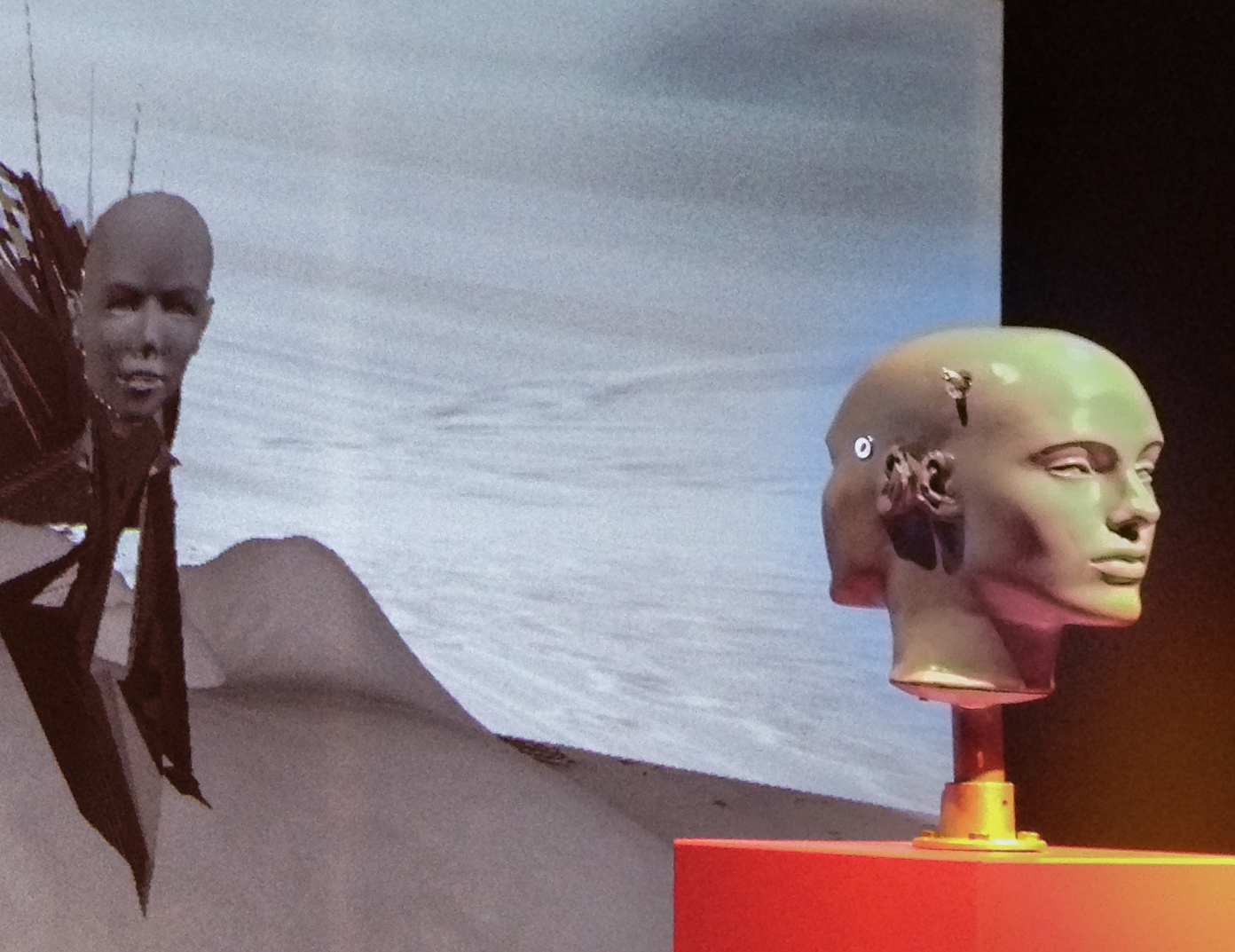

On the left, a screenshot of the partially unlocked narrative.

performing Xilitla at Blipfest NY and IMPAKT Festival Utrecht.

performing Xilitla at Blipfest NY and IMPAKT Festival Utrecht.
In Xilitla, the Angel of History, now double-faced as a result of her Refractions, navigates a surreal terrain.
She is in search for the lines of a non-linear poem that describes how her eyes came to bend backwards.
Each time she slips into the abyss (falls through the mesh) her world folds: she lands back on top of the PenRose Staircase to Nowhere.
In Xilitla, she falls and rises (but never dies), forever.
☰☰☰☰☰☰☰☰☰☰☰☰☰☰☰☰☰☰☰☰☰
As the player guides her with a custom controller, through a landscape made of broken vectors, fragments of a poem describing the Angel’s changing perspective appear one by one:
Navigating a garden of forked, broken vectors
Outside of depth, forever unfalling
inbetween ... ... liminalities
I feel like I know her, but sometimes, her eyes bend back
from far away, everything seemed clear
but as the surface broke
you fell through the looking glass
and suddenly you are no more than a reflection of my imagination
it was pattern recognition, beyond resolution
slightly yet completely different
☰☰☰☰☰☰☰☰☰☰☰☰☰☰☰☰☰☰☰☰☰
Xilitla is named after a little village in the Huasteca region of Mexico, where, in the early 1940s, Sir Edward James – a poet known for his patronage of the surrealist art movement – started the construction of his own idyllic, surrealist pool garden, Las Pozas, in which he deconstructed the many forms and styles of functional architecture.
☰☰☰☰☰☰☰☰☰☰☰☰☰☰☰☰☰☰☰☰☰
In this interactive piece, ‘Xilitla’ has been transformed into a futuristic 3D architectural environment consisting of moving images, laced with polygons and dysfunctional objects such as a castle filled with walls and a PenRose Staircase that goes to Nowhere.
A Janushead is a custom controller used to navigate the dreamscape that takes advantage of the tensions between gameplay and audiovisual art, while breaking outside of the square of video interfaces.
☰☰☰☰☰☰☰☰☰☰☰☰☰☰☰☰☰☰☰☰☰
I was inspired to build Xilitla because of my search for an interface to play my Videoscapes in. In a way, it became a research into opening up the possibilties of (watching and displaying) video art, in which videos are no longer stuck in a quadrilateral frame.
Technically, Xilitla is a 3D video environment that can be installed or used as performance tool or video interface, to present my videoscapes outside of the cliches that conventional platforms and softwares impose.
‘Xilitla’ exists as a free downloadable application, released in 2013.
An enhanced and expanded edition with three audiovisual video pieces documenting the work was acquired by the Museum of the Image in the Netherlands (MOTI) in 2014.
Xilitla was on display during the Istanbul moving image fair in 2015.
Download Xilitla for MAC || Windows || Linux
︎ Transfer Page
︎ A paper by Kristoffer Gansing. ︎review in WIRED
XILITLA WAS DEVELOPED DURING MY EMAP/EMARE RESIDENCY AT CENTRO DE LAS ARTES SAN LUIS POTOSÍ // CENTRO DE ARTE Y NUEVAS TECNOLOGÍAS (CANTE) in 2012
She is in search for the lines of a non-linear poem that describes how her eyes came to bend backwards.
Each time she slips into the abyss (falls through the mesh) her world folds: she lands back on top of the PenRose Staircase to Nowhere.
In Xilitla, she falls and rises (but never dies), forever.
☰☰☰☰☰☰☰☰☰☰☰☰☰☰☰☰☰☰☰☰☰
As the player guides her with a custom controller, through a landscape made of broken vectors, fragments of a poem describing the Angel’s changing perspective appear one by one:
Navigating a garden of forked, broken vectors
Outside of depth, forever unfalling
inbetween ... ... liminalities
I feel like I know her, but sometimes, her eyes bend back
from far away, everything seemed clear
but as the surface broke
you fell through the looking glass
and suddenly you are no more than a reflection of my imagination
it was pattern recognition, beyond resolution
slightly yet completely different
☰☰☰☰☰☰☰☰☰☰☰☰☰☰☰☰☰☰☰☰☰
Xilitla is named after a little village in the Huasteca region of Mexico, where, in the early 1940s, Sir Edward James – a poet known for his patronage of the surrealist art movement – started the construction of his own idyllic, surrealist pool garden, Las Pozas, in which he deconstructed the many forms and styles of functional architecture.
☰☰☰☰☰☰☰☰☰☰☰☰☰☰☰☰☰☰☰☰☰
In this interactive piece, ‘Xilitla’ has been transformed into a futuristic 3D architectural environment consisting of moving images, laced with polygons and dysfunctional objects such as a castle filled with walls and a PenRose Staircase that goes to Nowhere.
A Janushead is a custom controller used to navigate the dreamscape that takes advantage of the tensions between gameplay and audiovisual art, while breaking outside of the square of video interfaces.
☰☰☰☰☰☰☰☰☰☰☰☰☰☰☰☰☰☰☰☰☰
I was inspired to build Xilitla because of my search for an interface to play my Videoscapes in. In a way, it became a research into opening up the possibilties of (watching and displaying) video art, in which videos are no longer stuck in a quadrilateral frame.
Technically, Xilitla is a 3D video environment that can be installed or used as performance tool or video interface, to present my videoscapes outside of the cliches that conventional platforms and softwares impose.
‘Xilitla’ exists as a free downloadable application, released in 2013.
An enhanced and expanded edition with three audiovisual video pieces documenting the work was acquired by the Museum of the Image in the Netherlands (MOTI) in 2014.
Xilitla was on display during the Istanbul moving image fair in 2015.
Download Xilitla for MAC || Windows || Linux
︎ Transfer Page
︎ A paper by Kristoffer Gansing. ︎review in WIRED
XILITLA WAS DEVELOPED DURING MY EMAP/EMARE RESIDENCY AT CENTRO DE LAS ARTES SAN LUIS POTOSÍ // CENTRO DE ARTE Y NUEVAS TECNOLOGÍAS (CANTE) in 2012


